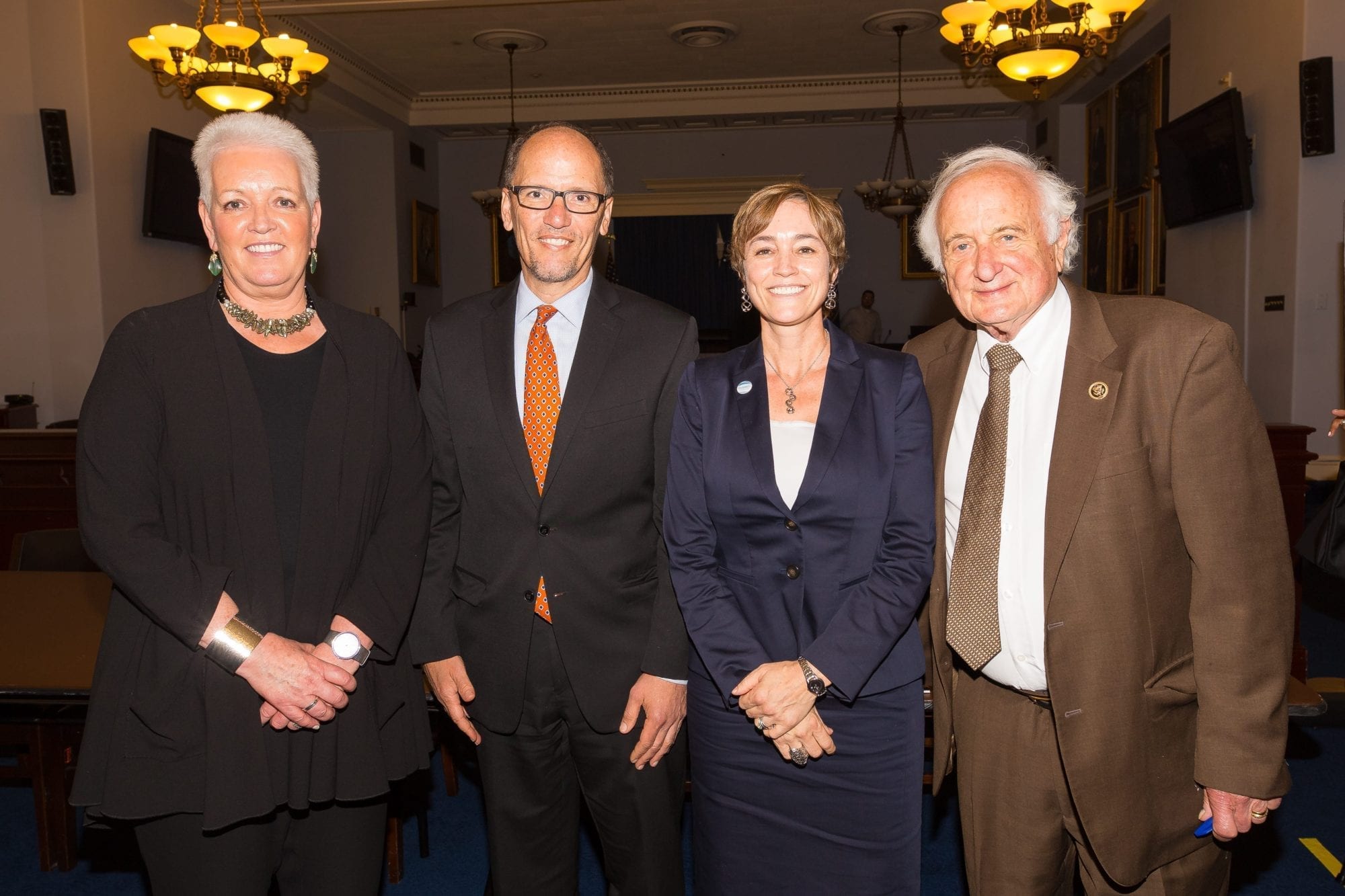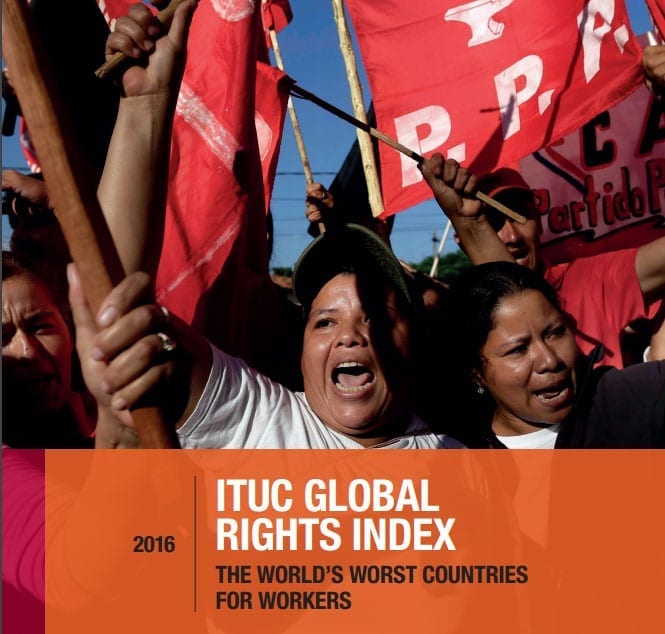
Jun 23, 2016
The murder of Brenda Marleni Estrada Tambito, deputy coordinator of the Legal Advisory Committee of the Trade Union of Workers of Guatemala (UNSITRAGUA / HISTORICA), was a “cowardly criminal attack” according to the Trade Union Confederation of the Americas (TUCA) union leaders, who strongly condemned her murder in a letter to Guatemala President Jimmy Morales Cabrera.
Estrada Tambito was shot five times and killed in Guatemala City June 19. She was followed from a bus terminal after dropping off her father, UNISTRAGUA leader Jorge Estrada y Estrada, who has been advising the negotiation of collective agreements in some of the banana plantations in the Department of Izabal. Several banana union leaders in Izabal have been murdered in Guatemala in recent years, and in 2014, 11 leaders from the UNSITRAGUA-affiliated banana workers’ union were fired on while at the plantation.
“This cowardly murder has again pushed families and the labor movement into mourning and reflects the climate and culture of fear of persecution and violent silencing that lingers in Guatemala and is suffered by workers, leaders and union officials,” TUCA (the Trade Union Confederation of the Americas) and its parent organization, the International Trade Union Confederation (ITUC), wrote.
“This situation is intolerable.”
Union activists are frequent targets for violence and harassment in Guatemala. In the first quarter of 2016, one union member was murdered, another physically attacked and 12 instances occurred in which union activists were threatened or harassed, according to the Red de Defensores de Derechos Laborales (Labor Rights Defenders Network) in Guatemala.
Last year, the Network, a coalition of trade union confederations and human rights monitors, documented 14 incidents of anti-union violence in Guatemala, including the October 2015 murder of Mynor Rolando Ramos Castillo, a municipal worker in southeastern Guatemala.
62 Unionists Murdered in Guatemala in Eight Years
Some 62 union members and leaders in Guatemala have been murdered since the U.S. government pursued an April 2008 complaint against Guatemala for violating the labor chapter of the U.S.-Central American Free Trade Agreement (CAFTA). The government acted after six Guatemalan unions and the AFL-CIO submitted a complaint with the Office of Trade and Labor Affairs (OTLA).
In an unprecedented move, the U.S. government last year agreed to take Guatemala to international arbitration for violating worker rights under CAFTA. The action was the first time that a country has sought international arbitration against another for a violation of labor standards and followed Guatemala’s failure to implement an 18-point enforcement plan to address worker rights violations. More than eight years since filing the complaint, labor rights violations and attacks continue, as the arbitration panel has announced another delay.
TUCA and the ITUC are urging the government to take steps to ensure the safety of trade unionists and to investigate and punish those responsible for Estrada Tambito’s murder. Despite ongoing violence against union members—murder, torture, kidnappings, break-ins and death threats—few perpetrators are brought to justice.

Jun 16, 2016
Some 70 countries around the world have taken action to advance decent work for domestic workers in the five years since the International Labor Organization (ILO) adopted Convention 189, the standard covering domestic worker rights.
The ILO passed Convention 189 on June 16, 2011, after a global coalition of domestic workers, led by the International Domestic Workers Federation (IDWF), mobilized tens of thousands of workers in a campaign for recognition of the workplace rights of domestic workers. Following passage of the standard, workers mark June 16 as International Domestic Workers Day.
Most recently, Morocco passed a law covering gaps in coverage for domestic workers. The bill, approved May 31 by the country’s House of Representatives, sets the minimum age for domestic work at 18 years and raises salaries to 60 percent of the minimum wage provided in other employment sectors. The bill allows for a five-year transitional period in which those between ages 16 years and 18 years can perform domestic work, providing they have written and signed permission from their legal guardians.
Both the Democratic Labor Confederation (CDT) and the Moroccan Labor Union (UMT) praised the law for ending child labor, which they called a form of slavery.
‘I Work from 6 a.m. to 11:30 p.m. Six Days a Week’
Some 53 million workers labor in households around the world, often in isolation and at risk of exploitation and abuse. Guire, an Ivory Coast migrant domestic worker in Rabat, Morocco, is among them. Guire, a mother of four children who has worked two years for her employer, toils long hours for low pay and says her employer treats her poorly. (We are using first names only to protect the workers.)

“I work from 6 a.m. to 11:30 p.m., six days week,” says Guire, a domestic worker in Morocco. Credit: Solidarity Center/Imane Zaghloul
“I work from 6 a.m. to 11:30 p.m., six days week,” says Guire, 41, in an interview with Solidarity Center staff in Morocco. “The work is really hard and I sleep in the living room on a sofa.” Guire says when she became sick, her employer did not provide her with medicine and she has no way to protest her treatment.
Amma, 32, a domestic worker from the Ivory Coast who also traveled to Morocco for domestic work, says employer requires her to “do everything.”
“I do housework, cooking, gardening, take care of the children,” says Amma. She says she is forced to sleep in the garage, is given little to eat and is regularly disparaged. “I receive insults like, ‘You are an animal,’” she says.
Since 2011, 22 countries have ratified the convention on domestic workers, although Morocco is not one of them. Neither Guire nor Amma were aware of the new legislation covering domestic workers, but as Amma says: “I demand respect because we are human beings, and if we come here it is to work, not beg.”

Jun 15, 2016
Laundry workers affiliated with the Bangladesh Independent Garment Workers Union Federation (BIGUF) at the Jeans Express Ltd. Washing Division factory in Chittagong, Bangladesh, successfully negotiated a collective bargaining agreement following a two-day strike in May.
As a result of the strike, the 70 laundry workers won a 6 percent wage increase, improvements in leave, access to purified water, a union office, a prayer space and an area where workers can eat meals. The union and management also committed to a dispute resolution process.
Law Makes Legal Strikes Nearly Impossible
The strike action—which, as a legal strike, is extremely rare due to onerous legal requirements—prompted management to bargain a contract with the union.
The union had sought to begin the collective bargaining process in December 2015, but management refused to meet with the union. As per Bangladesh labor law, the union filed complaints with the government, which made several attempts at conciliation without success. On May 2, all but one union member who voted in a secret ballot election overseen by the government’s Joint Director of Labor (JDL) voted in favor of a strike.
“This has been a great success following a six-month-long struggle,” says BIGUF Organizing Secretary Chandon Kumar Dey. “Now we must now ensure implementation of the agreement and help the union build a constructive relationship with the management.”

Jun 10, 2016
Solidarity Center allies—congressional lawmakers, policymakers, union leaders, human rights and democracy representatives and others—gathered on Capitol Hill to mark the launch of the Global Labor Program, a five-year cooperative effort by the Solidarity Center and the U.S. Agency for International Development (USAID) to promote worker rights, gender equality and democracy worldwide.
“Development cannot be sustained or inclusive without the availability of decent work,” said USAID Administrator Gayle E. Smith. “How do we reach workers? Through the Global Labor Program.
The following are photo highlights from the June 7, 2016, Washington, D.C., event.
[portfolio_slideshow id=8080]

Jun 10, 2016
Workers’ rights were weakened in most regions over the past year, according to the 2016 International Trade Union Confederation (ITUC) Global Rights Index.
Repression of worker rights was compounded by restrictions on freedom of speech and assembly, including severe crackdowns in some countries, which increased by 22 percent, with 50 out of 141 countries surveyed recording restrictions.
The ITUC Global Rights Index ranks 141 countries against 97 internationally recognized indicators to assess where workers’ rights are best protected, in law and in practice.
Global Rights Index Details Chilling Repression
- Unionists were murdered in 10 countries, including Chile, Colombia, Egypt, El Salvador, Guatemala, Honduras, Iran, Mexico, Peru, South Africa and Turkey.
- 82 countries exclude workers from labor law.
- More than two-thirds of countries have laws prohibiting some workers from striking.
- More than half of all countries deny some or all workers collective bargaining.
- Out of 141 countries, the number which deny or constrain free speech and freedom of assembly increased from 41 to 50.
- Out of 141 countries, the number in which workers are exposed to physical violence and threats increased by 44 percent (from 36 to 52) and include Colombia, Egypt, Guatemala, Indonesia and the Ukraine.
ITUC General Secretary Sharan Burrow summed up the global environment this way:
“Repression of workers’ rights goes hand in hand with increased government control over freedom of expression, assembly and other fundamental civil liberties, with too many governments seeking to consolidate their own power and frequently doing the bidding of big business, which often sees fundamental rights as incompatible with its quest for profit at any expense.”
Read the full report.






